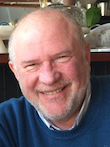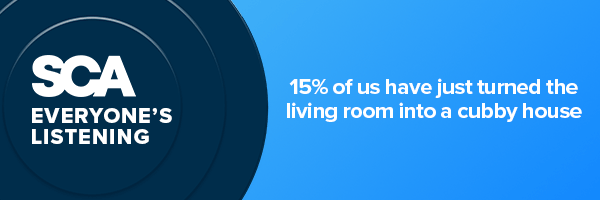SCA’s Dave Cameron tells Peter Saxon the “secret.”
Dave Cameron is SCA’s longest serving senior executive, having joined Austereo in 1994 as a jock on FOX in Melbourne during the network’s halcyon years.
In those heady days Austereo was Australia’s pre-eminent FM broadcaster. As one insider who has long since departed but worked there at the time told radioinfo, “Austereo has a great culture. It’s very much about winning and creating great work. There is a definite belief that they are number one and that they lead Australian radio – that they wrote the book on radio and no one contributed to any of the chapters. Not even a footnote.”
The FM radio landscape has changed considerably since then. The Austereo ‘swagger’ has long gone with most of this decade causing SCA “to suffer the slings and arrows of outrageous fortune” in Shakespearean proportions.
First, with the introduction of new management at Nova and ARN, the hitherto moribund competition suddenly became much more competitive. Then there was a slew of complaints about Kyle (and Jackie O) which brought about some advertiser boycotts and some onerous licence conditions courtesy of the ACMA. And who could have predicted that a routine prank call to the Duchess of Cambridge could lead to such tragedy as a nurse’s suicide?
The departure of marquee talent in Kyle and Jackie O, and later Hamish and Andy, shifted the momentum away from the former market leader which has been playing catch-up ever since. As a result, the top brass have all moved on – the Chairman, Max Moore-Wilton; CEO, Rhys Holleran; Content Director Craig Bruce and Chief Creative Officer, Guy Dobson.
Having held programming posts across the country, Dave Cameron was one of the few to make the cut and stay on.
New CEO, Grant Blackley quickly went about fixing SCA’s biggest problem, the cash bleed from its regional TV network of TEN affiliates. He staunched the wound by adroitly switching SCA’s affiliations to Nine. But Mr Blackley’s new regime has yet to turn the radio network’s fortunes around, particularly in Sydney and Melbourne.
Survey 2, just gone, gave management little joy as far as number one’s go. Apart from HIT105 managing a tie for first place in Brisbane and Perth’s MIX 94.5 clawing back leadership in a pitched battle with Nova after the former had dominated the market for years, there was little to cheer about as far as “line honours” go. Instead, it was left to the PR department to talk up the minor, or “handicap” placings in demos and timeslots.
Where it really matters, in Sydney and Melbourne, none of the former FM leaders are in medal contention. In Sydney, 2Day is in 9th place overall, FOX is in 5th while Triple M in Sydney is in 8th and its sister is 9th in Melbourne.
Having attained an MBA (technology) Dave Cameron was appointed to the C-Suite just four months ago as Chief Content Officer, putting an end to persistent rumours that the job was going to Dean Buchanan, the former Nova content supremo and more recently the Managing Director of NZME based in Auckland.
Cameron faces an enormous task to re-energise the network and turn it around at a time when all the momentum seems to be with his competitors. It’s a big ask – and then along comes COVID-19…
“I certainly didn’t expect what’s happening to be in my first six months in the role,” muses Cameron. “But it’s been quite gratifying to see how creative shows have been in this crisis. And although I didn’t predict this environment, certainly my ambition to drive all of our shows is to start taking some risks again. You know, original creative thinking again, not relying on a standard sort of contesting approach.”
Until COVID –19 hit, radio had enjoyed a steady, year on year, rise in revenue, ever since the end of the GFC of 2008. Now, with advertisers in retreat, no media is immune from the effects of this pandemic. Staff and budgets have been slashed, even with generous government handouts to keep people employed and businesses going. But anyone whose been in this industry as long as Dave Cameron, has had the experience of having to find ways to create more from less in times when belts must be tightened.
“The only thing that will get us out of this crisis is creativity,” asserts Cameron. “We’re doing things radically different to how we had even imagined eight or nine weeks ago. We’ve changed the way we are. We’re (creating new) programming on a daily basis.
“And to be fair I’m seeing our competitors do that as well. Watching radio as an industry really lift and lean into this crisis to deliver companionship again has really reminded us of what the power and the unfair advantage of radio is: which is that companionship and that ability to be able to turn on a dime and create content that connects instantly.
“This has proven again, in these moments of uncertainty, it really shows the real benefits and the unfair advantage that I think radio has.”
Perhaps the most noticeable changes can be heard across the Triple Network, going into a football season with no football. No tennis or Olympics or much of any sport, for that matter.
He agrees, “A lot of the Triple M breakfast shows are comedy-centric now. There’s a center of comedy at Triple M Brisbane, absolutely centric comedy in Triple M Sydney with the Moonman and Jess. Melbourne is obviously very different. They’ve had a fantastic run over the last 10 or 11 years with the Hot Breakfast. It has had sport as part of its DNA.”
While Cameron concedes, “We haven’t seen the best results on Triple M Melbourne at the moment,” he maintains, “The loss of sport content hasn’t been detrimental, but it’s certainly changed the approach of what we need to deliver in that show.”
On the other hand, he says, “I’m seeing great results on the on catch-up on that show and on streams. And I’m really encouraged by there’s still a really strong listener base around that show. And, you know, that show’s delivering Melbourne content probably better, just in the last two or three weeks, than it has in the last 18 months.”
As any good programmer knows, the most difficult part of growing an audience is getting people who listen to other stations to change their habits.
In that respect, through the dark clouds of COVID-19, Dave Cameron sees a silver lining, “Through this period of people working from home, new habits are forming all the time. In six months, we might end up seeing people choosing to listen to their favorite shows but not the live version, the catch-up version instead. People’s routines are changing and some routines permanently. Some of these up ended routines are forming new habits now and time will tell what that means for us. But all I can say is, right now, while we may not be getting some of the live listening runs on the board, we’re certainly getting to know catch-ups.
“The world is changing and we will continue to create content for wherever it will be consumed. And I think you know as you’ve seen radio content is really ubiquitous and just because there’s not as many people listening in the car on their commutes, doesn’t mean to say that they are not getting home and listening to it on their smart speakers now.”
While Dave Cameron is bullish about the future, the reality of the here and now hasn’t escaped him. I ask, with respect, whether the once mighty 2Day-FM could seriously be left with a purely music driven show that currently rates a 3.8 share in Breakfast?
“You can assume that I’m never going to be happy with a ratings result that’s sitting where it is in Breakfast. So at some stage, you can assume that we will reassess that strategy at the right time, But now, is not the right time… obviously.”

Peter Saxon
Subscribe to the radioinfo daily flash briefing podcast on these platforms: Acast, Apple iTunes Podcasts, Podtail, Spotify, Google Podcasts, TuneIn, or wherever you get your podcasts.




